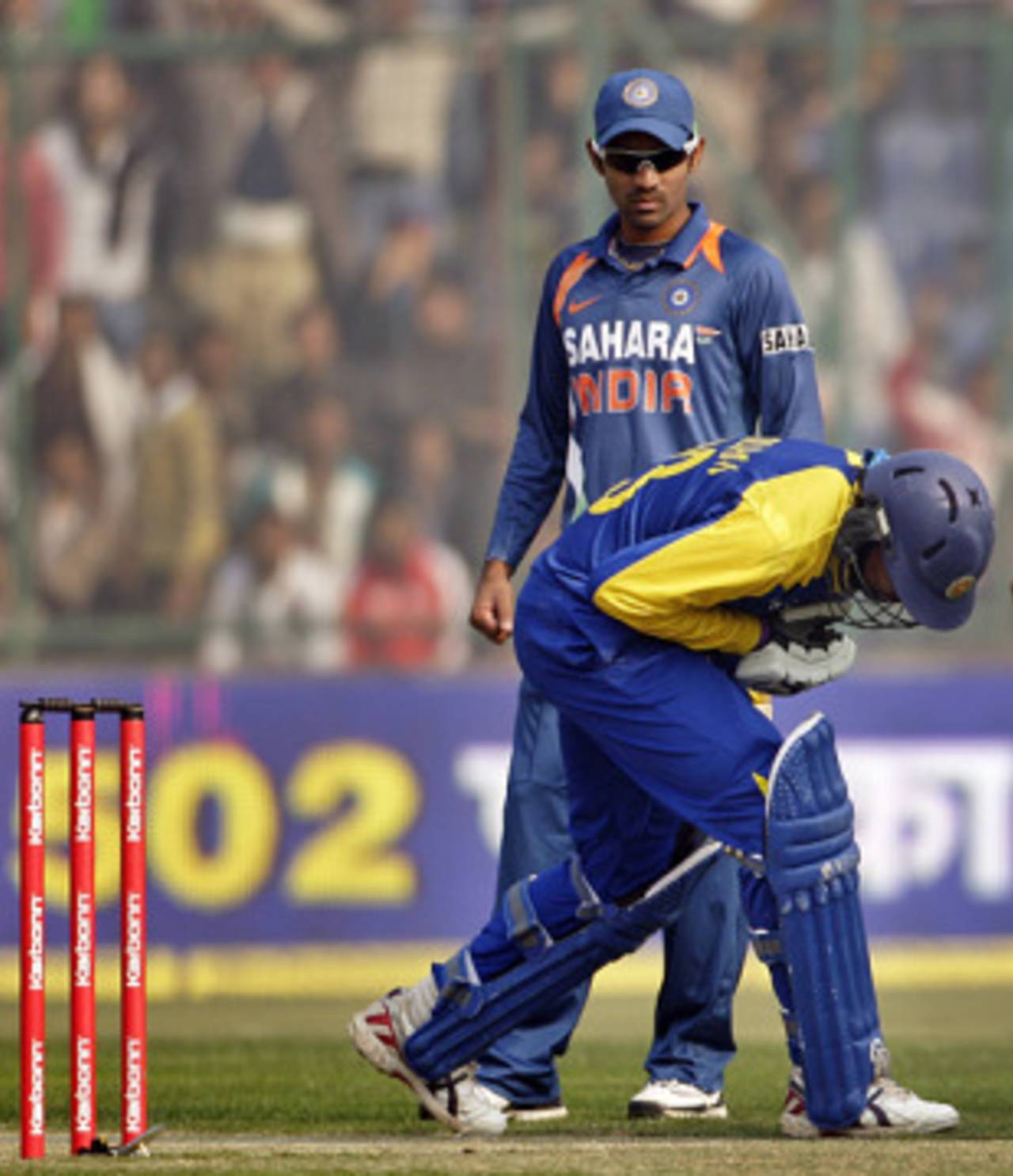Atkinson slams Delhi over ODI pitch
Andy Atkinson, the ICC's pitch consultant, has come down heavily on the ground authorities at the Delhi and District Cricket Association (DDCA)
Nagraj Gollapudi
23-Feb-2010

Tillakaratne Dilshan feels the pain after being struck during the abandoned ODI in December • Associated Press
Andy Atkinson, the ICC's pitch consultant, has come down heavily on the ground authorities at the Delhi and District Cricket Association (DDCA) for over-ruling the recommendation of Daljit Singh last year, which led to the abandonment of the final match of the India-Sri Lanka ODI series at the Feroz Shah Kotla on December 27. As a consequence, Daljit , chairman of the BCCI pitch and grounds committee, and his panel, were sacked the same day by the BCCI, which held him responsible.
But Atkinson, who visited various Indian venues hosting next year's World Cup earlier this month, inspected the Kotla pitch on February 14 and 15. Though he was happy with the remedial work in progress that has started under the supervision of Venkat Sundaram, former head of the BCCI curators' panel, Atkinson stated in the report to the BCCI, a copy of which was available to Cricinfo, that all the controversy could have been easily avoided if the DDCA ground officials had heard Daljit's suggestions.
"As a consequence of the state of affairs that occurred with the pitch throughout last
year, the decision to use of Perennial Rye grass was the only option left at a very late
stage in an attempt to obtain some grass cover for the ODI on the 27th December and
was recommended by Mr. Daljit Singh (Chairman BCCI Pitches Committee) quite
correctly as an emergency measure," Atkinson wrote.
"Unfortunately the then local authority of DDCA did not agree with that course of action and went ahead and planted some local Cynodon grass, creating damage to the surface levels in doing so," he added
In the eight-page report, addressed to Ratnakar Shetty, BCCI's chief administrative officer, Atkinson explained the disastrous consequences. "As predicted this grass did not grow then, and now the remains of it which is decomposing below the surface of the pitch will need to be removed mechanically so that the organic content will not further dilute the clay content of the soil and reduce the ability of that soil to produce fast hard pitches in the future."
According to Atkinson the surface level, too, was damaged as a result of using a heavy roller, thereby "creating low and high areas (Ridges)". This was amply evident during the Sri Lanka ODI where Alan Hurst, the match referee, in his report submitted to the ICC few days after the game, said he was forced to stop the match after 23.1 overs because he deemed the Kotla pitch "dangerous" and "unfit".
Consequently the ICC penalised the Indian board and suspended the venue from hosting any international matches until the end of 2010. Though the BCCI appealed against the ICC decision, which was arrived at by the pair Dave Richardson, the ICC's general manager of cricket, and Ranjan Madugalle, the chief match referee, Michael Beloff QC rejected their plea, insisting the penalty was in order.

Fans were not happy when the match was called off and Andy Atkinson said the situation could have been avoided•AFP
Last April, after the second edition of the IPL had moved to South Africa, DDCA decided to re-lay the whole ground and Daljit was appointed as a consultant. But just months after the main pitch block was re-laid, DDCA agreed to host the Champions League Twenty20 games, an erroneous decision according to Atkinson.
"The new grasses planted then were not given adequate time to grow in and establish a resilient deep root structure," he wrote, "and when rolling began to prepare the pitches for the IPL Champions League the grass quite unsurprisingly died off as it was too delicate at that time to survive the stresses that were put on it by the act of rolling."
But he is against the re-laying the entire pitch square. "I can find no appropriate reason to excavate and reconstruct the pitch block at this time," Atkinson said. "The basic construction of the pitch block as supervised by Daljit Singh is sound in my opinion and the reasons for the problems encountered were basically self inflicted by basic and terminal mistakes made by playing on the pitch far too early after its reconstruction in 2009."
With just twelve months to go until the World Cup the process is at a critical stage to get the Kotla back in shape. But Atkinson is not panicking yet as long as his suggestions are followed. "The problems to be overcome for CWC 2011 are fundamental issues of additional correction of the surface levels and ensuring the re‐establishment of the correct grass species by replanting the entire pitch block with the most suitable grasses for its long term benefit."
If the various authorities, and importantly the DDCA, adhere to his guidelines, Atkinson said Delhi would have no problems in hosting their four World Cup games. But there are some strict timelines that need to be adhered to. As soon as the last IPL game ends on April 17, Atkinson has said there will be no play at the ground, which would then undergo complete corrective work for 20 weeks between April 17 and August 31. This would be followed by hosting trial matches to test the pitches between September 1 and November 30. For the next 16 weeks, between December and February 17, 2011 the ground would be completely closed for maintenance and preparations of the pitches and the venue.
Atkinson also stated that he would be visiting Delhi frequently, starting on March 15, two days ahead of the first IPL game, to inspect the developments.
Nagraj Gollapudi is an assistant editor at Cricinfo